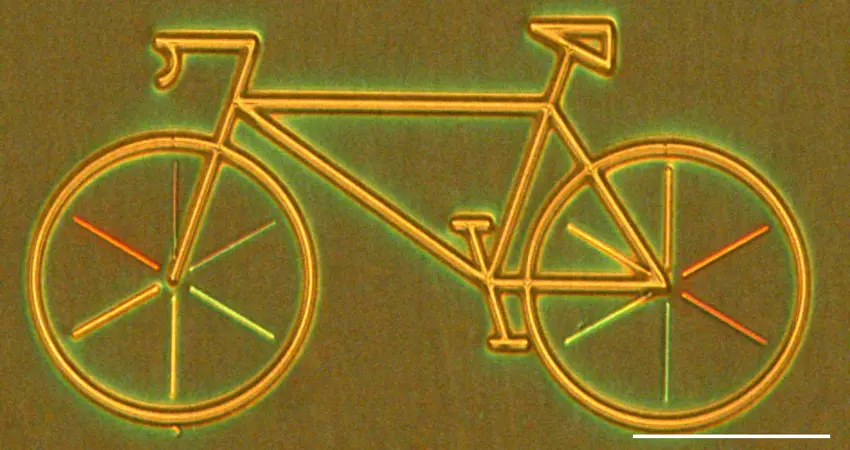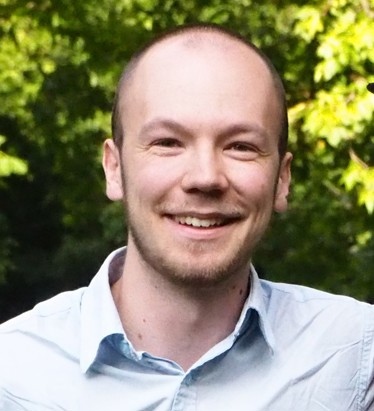31 Jul 2019
Flexible screens and nanoscale printing earn national recognition for DPhil candidate
IET Award for 3D printing technique which uses lasers to build photonic microstructures out of liquid crystal materials.

Polymerizable liquid crystal microbicycle fabricated with laser 3D printing
John Sandford O’Neill has been announced as the recipient of an Institution of Engineering and Technology (IET) Postgraduate Award – a highly competitive national scheme which rewards the most innovative, high-impact research currently being undertaken by PhD students around the UK.
The judges were impressed by the real-world potential of his research, which uses lasers to 3D print at the micro scale and build photonic structures from liquid crystals.
Unlike the large 3D printers that you might be familiar with (which apply layer after layer of plastic to manufacture objects), John’s technique uses laser micro-machining to create microscale polymer structures. Instead of plastic, his ‘resin material’ is liquid crystals - the same thing found in the LCD (Liquid Crystal Display) screen that you’re probably reading from right now.
A state of matter with properties that fall between those of liquids and of solid  crystals, liquid crystals are photonic materials; that is, they react to and interact with light. “This is really important,” he explains, “because once it’s manufactured, we can change the properties of our microstructure just by exposing it to light. Imagine a corrugated sheet, folding up and unfolding as you flick a light on and off.”
crystals, liquid crystals are photonic materials; that is, they react to and interact with light. “This is really important,” he explains, “because once it’s manufactured, we can change the properties of our microstructure just by exposing it to light. Imagine a corrugated sheet, folding up and unfolding as you flick a light on and off.”
This technology has wide-ranging promise. It could be useful in the field of telecommunications to manufacture optical fibres with new functionality, and in the development of new Virtual Reality (VR) display technologies. It could even lead to us finally achieving the kind of flexible LCD screens that have been predicted for so long.
“My focus now is on applying the lessons that I’m learning here to the field of micro-robotics,” John explains. “Picture that corrugated sheet, folding and unfolding as a light turns on and off – you can easily imagine how that would create something capable of swimming. And that’s just one type of stimulus. We could also apply heat to induce disorder in the liquid crystalline system, achieving a similar result.”
John is a member of both the Soft Matter Photonics (SMP) and Dynamic Optics & Photonics (DOP) groups in the Department and is supervised by Dr Patrick Salter and Professors Steve Morris, Steve Elston and Martin Booth.
Before joining the Department, John studied Natural Sciences at University College London. It influenced his decision to enter this field: “My degree involved a mix of chemistry and physics. It was very theoretical, and it made me realise that I wanted to do something more applied. That’s what I enjoy so much about Engineering Science.
“It’s also why I was so keen to get industrial sponsorship for this research. My DPhil is being part-sponsored by Merck, with whom I’ve been looking into diffractive optics, useful for holograms and VR. Before that, I spent a year working with SHARP Laboratories at the Oxford Science Park, investigating novel laser technology, and so I’m determined to do research that has an impact outside of the lab.”
Five IET Postgraduate Scholarships are awarded each year, recognising outstanding young researchers whose work demonstrates excellence and innovation. Providing support for high-quality engineers, they are part of a £1,000,000 scheme of awards and prizes aiming to inspire and help the next generation of engineers and technicians. John will be presented with his award at a ceremony in London this October, taking place at the IET’s Savoy Place headquarters.
John adds: “I am absolutely delighted to have been recognised by the IET for my DPhil research, it makes all those hours in the lab worth it! It’s really gratifying to get such positive feedback from the wider engineering community and I’m looking forward to using this award as a springboard to engage with the public and further develop my skills in science communication.”
“This work would not have been possible without the support of my extraordinary colleagues in the Engineering Science Department. I’d particularly grateful to Dr Patrick Salter, Professor Steve Elston, Professor Steve Morris and Professor Martin Booth for their kind support and guidance throughout my DPhil.”
Among the other winners at the IET Postgraduate Awards will be Oliver Vince, recognised for his work on the use of ultrasound in drug delivery, and Saumya Jetley, who impressed the judges with her machine learning research.




